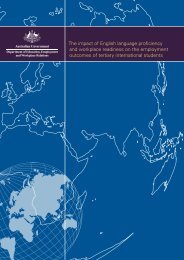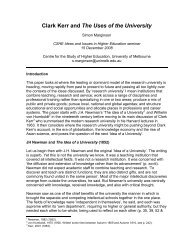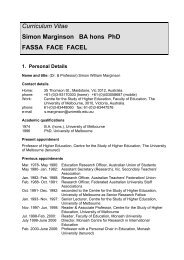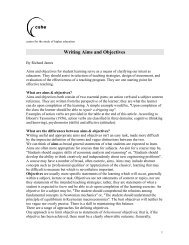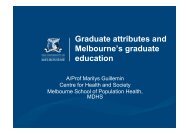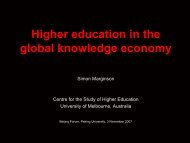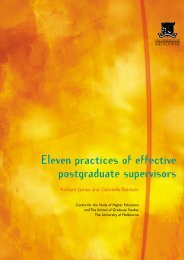The preparation of Mathematics Teachers in Australia - ACDS
The preparation of Mathematics Teachers in Australia - ACDS
The preparation of Mathematics Teachers in Australia - ACDS
You also want an ePaper? Increase the reach of your titles
YUMPU automatically turns print PDFs into web optimized ePapers that Google loves.
Table 6.8 Career plans <strong>of</strong> early career teachers, grouped accord<strong>in</strong>g to previous employment<br />
Response to the question:<br />
Do you th<strong>in</strong>k that you will be teach<strong>in</strong>g secondary school<br />
<strong>Mathematics</strong> teachers<br />
mathematics <strong>in</strong> 5 years time?<br />
with < 5 years<br />
teach<strong>in</strong>g experience Yes Probably Unsure No<br />
Teach<strong>in</strong>g as first<br />
pr<strong>of</strong>ession<br />
(n= 230)<br />
Previously employed<br />
(n=234)<br />
37.0% 33.5% 19.6% 10.0%<br />
49.1% 23.1% 18.4% 9.4%<br />
6.4 <strong>The</strong> teachers <strong>of</strong> junior, middle and senior schools mathematics classes<br />
Section 6.2 describes the characteristics <strong>of</strong> all mathematics teachers, <strong>in</strong>dependent <strong>of</strong> the type <strong>of</strong><br />
mathematics that they taught. In this section, teacher characteristics are described from the<br />
perspective <strong>of</strong> the mathematics taught, rather than the teachers. For example, where the focus is on<br />
middle school mathematics, the characteristics <strong>of</strong> all teachers teach<strong>in</strong>g at that level is presented.<br />
A teacher-focused analysis <strong>of</strong> teach<strong>in</strong>g patterns, <strong>in</strong>clud<strong>in</strong>g analysis <strong>of</strong> age and teach<strong>in</strong>g experience,<br />
is presented Chapter 3, Section 3.2. This section makes reference to Chapter 3, and to Table 3.5 <strong>in</strong><br />
particular.<br />
<strong>Teachers</strong> <strong>of</strong> junior school mathematics were the group <strong>of</strong> mathematics teachers most likely to teach<br />
non-mathematics subjects (Table 6.9). <strong>The</strong>y also tended to be, on average, younger and less<br />
experienced. Conversely, teachers <strong>of</strong> senior school mathematics are the eldest, most experienced<br />
and least likely to teach non-mathematics subjects. More pronounced differences emerged <strong>in</strong> the<br />
characteristics <strong>of</strong> teacher groups when senior school mathematics were analysed by level <strong>of</strong><br />
complexity (Table 6.9). <strong>Teachers</strong> <strong>of</strong> advanced senior mathematics were typically male, highly<br />
experienced and among the least likely to teach non-mathematics subjects.<br />
As Table 6.9 describes all teachers <strong>in</strong>volved <strong>in</strong> teach<strong>in</strong>g a particular school level, and because many<br />
teachers were <strong>in</strong>volved <strong>in</strong> teach<strong>in</strong>g several school levels (see Chapter 3; Table 3.5), some more<br />
pronounced differences <strong>in</strong> teacher groups were masked. Table 6.10 describes the characteristics <strong>of</strong><br />
three groups <strong>of</strong> teachers with ‘narrower’ mathematics teach<strong>in</strong>g responsibilities - those who teach:<br />
only junior or middle school mathematics; only senior mathematics; or only <strong>in</strong>termediate or advanced<br />
senior mathematics.<br />
<strong>Mathematics</strong> teachers who do not teach senior school are far more likely (78%) to teach nonmathematics<br />
subjects than are those who teach <strong>in</strong>termediate or advanced senior mathematics (44%)<br />
(Table 6.10). <strong>The</strong> difference <strong>in</strong> teach<strong>in</strong>g experience is equally marked. Those who do not teach<br />
senior school have a median <strong>of</strong> ten years teach<strong>in</strong>g experience, <strong>in</strong> contrast to a median <strong>of</strong> 22 years for<br />
those who teach only senior school (Table 6.10).<br />
<strong>Teachers</strong> whose mathematics teach<strong>in</strong>g is restricted to junior school (see Chapter 3, Table 3.5) are,<br />
on average, younger than their colleagues (39.1yrs) (p



